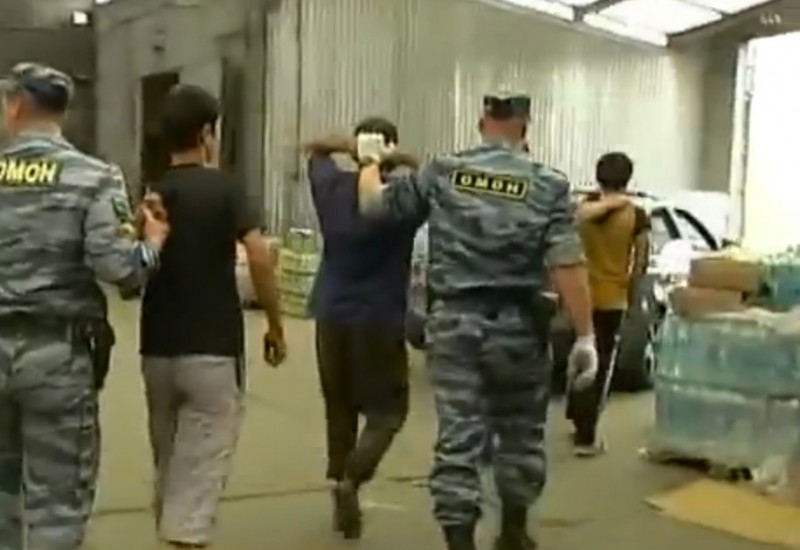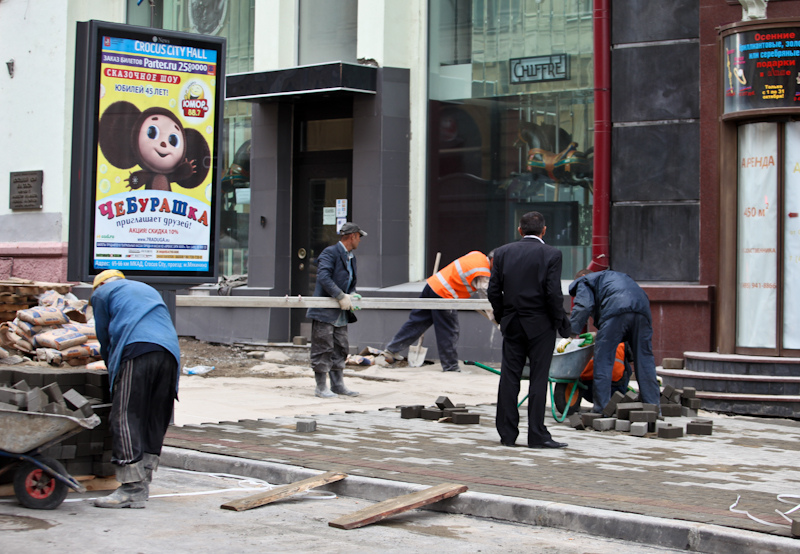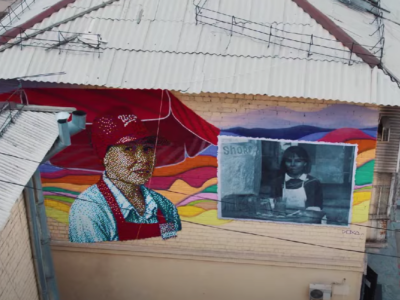
Migrants detained at a raid on a Moscow market. Authorities have been cracking down in what some see as an appeal to Russian nationalism. YouTube screenshot.
Public unrest, rioting, and the destruction of a vegetable warehouse in Moscow's Biryulyovo district has once again forced Russia to confront its “nationality question.” The unrest follows the murder of 25-year-old Egor Shcherbakov, allegedly at the hands of an Azerbaijani national.
“Progressive,” anti-Kremlin nationalists like Alexey Navalny [ru] and Egor Holmogorov [ru] have used the rioting as a springboard to call for the introduction of a restrictive visa regime with the countries of the South Caucasus and Central Asia. Pro-Kremlin bloggers like Stanislav Apetyan [ru], on the other hand, chalk the violence up to religious tension and police incompetence. The one voice that is largely missing from public dialogue, is of the “people of non-Slavic appearance” — a vague term that describes millions of Russia's ethnic minorities, both migrants from the former Soviet Union and the internal enclaves of the North Caucasus. These folks have perhaps the most at stake in the developing dialogue, and some of them have been speaking out online.
For instance, an Azerbaijani blogger based in Baku, lon43, wondered [ru] why Caucasian and Central Asian immigrants in Ukraine and the Baltic states haven't caused the same levels of social tension. His answer is that the unrest had been cynically whipped up to serve a wide variety of domestic and foreign interests: a redrawing of Moscow's criminal spheres of influence and forcing holdouts among the former Soviet states into a Customs Union with Russia.
Other Azerbaijanis were more self-critical. Tair Aliev, a 53-year-old plastic surgeon who moved from Baku to Moscow when he was nine, wrote about how poorly suited some of his compatriots were for life in Russia and claimed that the situation would have come to a head years ago if it hadn't been for the Russian national character of “hospitality, tolerance and laziness.” In a post entitled “Who prevents us from having a normal life?” [ru], Aliev noted how his childhood views of Baku as a cultured and cosmopolitan city had been ruined by the Azerbaijanis he actually met when the Soviet Union disintegrated:
Они плохо воспитаны, плохо говорят по русски, многие неопрятны и имеют вид дикарей. Поэтому ещё тогда, в середине 90-х, я стал опасаться, что по национальному признаку буду ассоциироваться с ними
They are poorly brought up, speak Russian poorly, many of them are slovenly and look like savages. This is why even in the mid-90s I began warrying that because of my national background I'd be associated with them.
Aliev's views are largely atypical for Russian minorities. Nazim Kalcha, an ethnic Kyrgyz living in Moscow, noted the irony [ru] of how Central Asians seem to always be targeted in response to murders of ethnic Russians by South and North Caucasians. Writing on the Central Asian online news portal Fergana News, Kalcha claims that Russian hostility is simply projection:
Раздраженному, обманутому и обозленному народу нужен четкий и конкретный враг, с резкими контурами, чтобы выделялся, контрастировал с основной массой. Может, нос побольше, или глаза поуже, для верности еще, чтобы по-русски ни бельмеса, а если и бельмеса, то самую малость.
An irritated, bamboozled and angry people need a clear and concrete enemy, with sharp contours, one that is in stark contrast with the general populace. Perhaps the noses are slightly bigger, or the eyes slightly narrower, and to round off the picture, someone that doesn't speak any Russian, and if he does, then just a bit.
The Biryulyovo riots were also discussed at length [ru] in the comments section of the independent Uzbek News site UZNews.net, where many were incensed at the treatment of migrants in Russia. One user, “hank,” writing in transliterated Russian, placed the blame on the Soviet Union's failure to implement a working nationalities policy, somewhat confusingly using the United States as a counter example:
Posmotrite na Ameriku – kakie tam nacionalnosti?? pravilno – vse amerikanci. tak oni reshali razom vse nacionalnie voprosi.Uchites! A v SSSR vsyu dorogu -70 let mi imeli russkiy nacionalniy imperializm.
Take a look at America – what nationalities do they have there?? That's right – they're all Americans. That's how the solved all their nationality problems at once. Learn from it! But in the USSR for the entire 70 years we had Russian ethnic imperialism.
Another user, who posted under the name “Non-Russian”, sarcastically flipped the tables on the proposed visa regime:
Был бы я главой Средней Азии, с Россией отменил бы без визовый режим. Раз народ без работы, пусть лучше едут в ту же Турцию или Корею (там сотни тысяч узбеков трудятся мирно и спокойно, на порядок лучше России и никто никого не гонит не то что бы убивать). Пусть Россияне сами свои улицы подметают, посмотрим смогут ли ваши алкоголики нормально работать.
If I were in charge of Central Asia I'd cancel the visa-free regime with Russia. The unemployed are better off in Turkey or Korea (there are hundreds of thousands of Uzbeks there working peacefully, exponentially better than in Russian, and no one persecutes them, let alone kills them). Let the Russians sweep their own streets, lets see if your alcoholics can work properly.

“Let the Russians sweep their own streets” – despite populist nationalism, Russia is heavily dependent on migrant labor. Photo CC2.0 Cea
Regardless of such sentiments, Central Asia and the Caucasus are extremely dependent on Russia for jobs and remittances. Almost half of Tajikistan's entire GDP is based on remittances from Russia. At the same time, Russia's economy is dependent upon a pool of cheap migrant labor. While economics and history still bind Russians, Uzbeks, Tajiks, Dagestanis and Azerbaijanis together, government inaction in the face of rising nationalism means inter-ethnic relations will continue to deteriorate.







